Have you noticed your Yorkie sitting in the corner and itching itself? It is challenging to watch your Yorkie distressed. If you are questioning why “Why Does My Yorkie Scratches All The Time?”, you have come to the right place.
In this article you will understand:
- 5 Tips To Help Your Yorkie From Scratching All The Time
- 15 Reasons why your Yorkie scratches all the time
- Some interesting facts and findings.
- And more…
Why Does My Yorkie Scratches All The Time?
One reason for your Yorkie scratching every time is because of small insects such as fleas and ticks crawling and nibbling on its skin. This causes irritated skin on your dog’s coat causing your Yorkie to scratch all over every time. Using various preventative tools to reduce the constantly scratching behavior of your Yorkie.
- Why Does My Yorkie Scratches All The Time?
- Why Does My Yorkie Scratches All The Time? Top 15 Reasons
- 1. Fleas and Ticks
- 2. Parasites and Mites
- 3. Matted Hair
- 4. Dead Hair
- 5. Leftover Suds After Bathing
- 6. Improper Hygiene
- 7. Skin Allergies
- 8. Food Allergies
- 9. Hormonal Imbalance
- 10. External Pain
- 11. Boredom
- 12. Stress and Anxiety
- 13. Prolonged Exposure to Dust and Dirt
- 14. Neurogenic Scratching
- 15. Nutritional Deficiency
- 5 Tips To Prevent Your Yorkie From Scratching All The Time
Why Does My Yorkie Scratches All The Time? Top 15 Reasons
Let’s get straight into the article and look at all the possible reasons your Yorkie scratches all the time.
1. Fleas and Ticks
According to a study, flea allergy is the most common cause of itchy skin in dogs, and your Yorkie is no different. Fleas thrive in environments that are warm and humid. Thus, a perfect hiding spot for them is on the carpet, under your Yorkies’ belly, near the ears, and the tail.
Once they find a host, they start feeding on blood. This feeding on your Yorkie’s skin causes itchiness. To then get rid of the itchiness your Yorkie scratches himself.
Here are some facts about fleas stated by PetMD:
- A single female flea can lay up to 20 eggs in a day and can cause a major infestation in less than 2 months.
- Your pet can develop an allergic reaction to flea saliva on the skin which causes your pup to constantly itch. If this isn’t treated, it can lead to major skin problems.
- This feeding on your little pet’s blood can cause them to be severely dehydrated leading to conditions like anemia.
All of this goes to show the impact a flea infestation can have on your little Yorkshire terrier. Treating it as soon as it is noticed is extremely important to relieve your Yorkie’s body itching and reduce further skin conditions and problems due to it.
2. Parasites and Mites
Parasites like ticks and mites can cause a severe skin reaction in your pup if not dealt with. Ticks are found in bushes, shrubs. These ticks host on your Yorkie’s body particularly on their neck, ears, and between toes causing skin irritation.
According to the American Veterinary Medical Association, an adult female tick can drink up to 100 times more blood than her actual weight. This means that if a tick infestation is not caught, your Yorkie will have bruises by constantly itching itself and become severely anemic.
When talking about mites, the most commonly seen mites besides ear mites are sarcoptic mange mites. According to Dr.Ernest Ward,DVM at VCA hospitals, these mites are present just below the surface of a dog’s skin causing intense itching. Common symptoms of these mites are skin rash, crusting, and hair loss.
Thus, if you observe any of these in your little Yorkie and think to yourself “Why does my yorkie scratches all the time?” you should consult your vet immediately.
3. Matted Hair
According to PetMD, matted hair in dogs is caused due to knots and tangles in their fur.
If you do not groom your Yorkie too often or do not brush their fur, your Yorkie is very likely to have matted hair. This then further leads to skin rashes and irritation, flea and parasite infestations on your Yorkie’s body.
Hence, it is essential to know in detail how to groom a Yorkie with matted hair.
4. Dead Hair
Even though Yorkies do not shed, Yorkies go through the same process of having dead hair like humans where strands of hair just die out. If the dead hair is not removed, the lack of air circulation can cause your Yorkie to itch itself.
According to Dr. Sarah Wooten, DVM, dead and dull hair in your Yorkie, makes their fur feel rough and brittle. This again causes them to itch themselves. This can be reversed by increasing amounts of Omega 3 fatty acids to their diet.
Thus, introduce these fatty acids to your Yorkie’s diet if you haven’t already and brush your Yorkie’s hair regularly to get dead skin cells and dead hair to reduce the itching. As per PetMd, eggs and meat are great sources of fatty acid for your Yorkie.
5. Leftover Suds After Bathing
If you want to address the issue of “My yorkie scratches all the time”, one way is to be extra thorough when showering your Yorkie.
If Yorkie has some leftover soap froth left on his body after bathing, the soap might get dried up on your Yorkie’s skin leading to matted hair. This then causes your dog to attract fleas, mites, and dirt causing itchiness and possibly skin infections.
Yorkies are furry little pets. Thus it is important for you to take some extra time and rinse off all the soap and residue from its body and to wipe it dry.
6. Improper Hygiene
If you bathe your Yorkie rarely and it’s always playing around in dirt and mud, it is likely to contract fleas, excess oil, and dirt causing the growth of bacteria on its skin causing your dog to scratch itself to relieve the itch and discomfort. It can also lead to severe skin conditions if it gets excess.
Thus, bathing your dog is very important. According to Dr. Juile Schell, DVM, dogs enjoy and feel amazing after a good bath. She says that the act of bathing is similar to a massage for them especially when shampoo is lathered on their body. Thus, bathing can help reduce itchiness and also leave your pet feeling good.
7. Skin Allergies
According to the Animal Medical Center of Southern California, common causes of canine allergic dermatitis are food allergy, flea allergy, inhalant allergy, and bacterial and yeast infection on the skin.
You can identify these skin allergies in your dog by looking for the following symptoms:
- Constant itching
- Skin sores and bumps
- Rashes
- Lumps
Here is a video of a Yorkie with a yeast infection on its skin. The infection is bound to cause discomfort to your Yorkie, causing him to scratch himself all the time.
8. Food Allergies
As per the VCA hospitals research, dogs are allergic to soy, fish, pork, lamb, and dairy products. These allergies may show up on the surface of your Yorkie’s skin in the form of skin rashes or allergies causing them to itch.
The best and most accurate way to diagnose food allergies is to administer an elimination trial where you feed your dog a hypoallergenic diet for eight to twelve weeks, says Dr. Catherine Barnette, DVM.
This means that you feed your dog a “novel” protein that your dog has never encountered before, lowering the risk of an immunological reaction. Hypoallergenic dog food alternatives include deer and potato, duck and pea, salmon and potato, and even kangaroo, as long as your dog hasn’t been exposed to these foods before.
You will have to first examine which exact food besides the ones stated above is causing an allergy in your Yorkie and then cut them out from their diet.
9. Hormonal Imbalance
Dr. Robert Kemppainenn, DVM explains that hormones are chemical messengers of the body. Some examples include insulin which regulates blood sugar levels while estrogen and progesterone and responsible for the female reproductive cycle.
Furthermore, PetMD talks about skin and hair disorders like alopecia and dermatosis in dogs that are caused due to imbalance in the reproductive hormones of canines which may be the reason for your Yorkie’s itching. Here are some symptoms of these hair and skin diseases you can check for in your Yorkie:
- Itching
- Soft and dry fur
- Darkening of skin
- Secondary dandruff and bacterial infections
- Blackheads on the skin
Imbalances in thyroid and cortisol levels in your Yorkie can also cause skin irritations. They may start getting bald patches on their skin. If you observe things like these with other symptoms given below, you should contact your veterinarian for more information.
- Skin problems and infections
- Sudden weight loss or weight gain
- Lethargy and weakness
- Increased thirst
- Panting
- Excessive urination
10. External Pain
Many times external injuries in your Yorkie might go unnoticed. If you find yourself starting to wonder “Why my yorkie scratches all the time?”, you can examine your dog for any injuries.
Yorkies are small dogs and therefore can get hurt easily either on their leg or because of falling from a height, having a paw-related injury, or having slipping kneecaps. To soothe the itch or pain in the area, your Yorkie may then itch it.
Thus, contact your vet if you see your Yorkie scratching itself along with other symptoms like:
- Lethargy
- Diarrhea
- Swelling
- Inflammation
11. Boredom
Yorkies are extremely active pets and if they do not get the right amount of physical and mental stimulation, they tend to direct their attention towards themselves for entertainment and to kill boredom. Thus, they might begin to scratch parts of their body.
If there is no underlying medical condition or flea infestation, your Yorkie is probably bored and itching themselves. You can turn this around by giving them toys and things to do which we will discuss further in more detail.
12. Stress and Anxiety
If there are constant loud sounds where you live or a noisy child, your little Yorkie will often be frightened. To deal with it, they may stressfully scratch themselves.
Another reason could be due to separation anxiety, which happens when your Yorkie finds it difficult to stay alone. Studies show that dogs with separation anxiety engage in undesirable and unwanted behaviors. It also leads to distress in both the dog and the pet owner. Thus, the built-up anxiety in your dog leads them to anxiously draw attention inward and scratch themselves to kill time till you get home.
Here is everything you need to know about Yorkie’s separation anxiety.
Also read: Can Yorkies Be Left Alone?
13. Prolonged Exposure to Dust and Dirt
If your Yorkie constantly plays in your backyard or is very often taken to the dog park and outdoors, they might develop things like dandruff and contract fleas. This will then cause them to scratch themselves. This can be taken care of by bathing your Yorkie and keeping it away from dust and dirt as much as possible.
14. Neurogenic Scratching
Also called phantom or fictive scratching is repetitive and constant scratching towards the shoulder area. Canine syringomyelia (SM) which is associated with phantom scratching is defined by Dr. Robert Downing, DVM, as fluid-filled cavities in the spinal cord of dogs that cause abnormal sensations in them.
An MRI study on SM-associated phantom showed that scratching in dogs was associated with a large syrinx that extended into the mid-cervical superficial dorsal horn.
These neuropathic itches are treated using topical anesthetics. You can talk to your vet and inquire for more details on the same.
15. Nutritional Deficiency
According to Dr.Robert Downing, DVM at VCA hospitals, a nutritional deficiency can harm a dog’s skin and coat. If you feed your Yorkie homemade food for a long time or commercial dry food, has low-fat content, is nutritionally excess, or is of poor quality, it can lead them to dry and flaky skin.
This in turn causes your Yorkie to scratch themselves to relieve the itchiness on its skin.
To make up for this nutritional deficiency introduce your Yorkie to food rich in proteins, carbohydrates, and omega 3 fatty acids.
5 Tips To Prevent Your Yorkie From Scratching All The Time
Now let’s look at ways to treat and prevent your Yorkshire terrier from scratching its body all the time.
1. Treat Parasites, Fleas, And Mites
If your Yorkie is flea-infested, you can start off by using a No products found. and No products found. to get rid of them.
This will help reduce the itching behavior in your Yorkie. Medicated shampoos and dips are used to treat mites in pets.
Vets usually recommend dewormers and antibiotics to treat parasites. Check with your vet for more details regarding the same.
In addition to this, you can prevent your Yorkie from triggering allergens by keeping your own home neat and clean, cleaning its spot, food bowls, using good house cleaners and detergents, and so on
2. Proper Bathing
According to Daniela Carrera, a certified dog trainer, and owner of a dog center in the US, Yorkies with long hair need to be bathed every week while those with short hair need to be bathed every 3 weeks to maintain good physical hygiene.
This will reduce dirt accumulation on its skin and there are also fewer chances of your pup having matted hair and fleas. All of this might slowly and gradually contribute to a healthy, itch-free Yorkie.
If you see a skin irritation-like condition on your Yorkie, you can ask your vet for advice. They might recommend some kind of topical sprays that you might have to use after bathing or every time your Yorkie returns home from outside.
If it is serious, they might recommend antibodies, immunotherapy, or allergy shots for your little pup.
Sometimes using aloe vera gel is a good home remedy to soothe the irritated skin on your Yorkie’s body. Simply apply the gel on the affected area of your Yorkie’s skin. The cooling sensation of the aloe vera gel might relieve your Yorkie and not cause itching for that short period of time.
However, remember that this is a temporary fix and you should not take it as the “solution” to treat irritated or infected skin on your Yorkie’s body.
3. Changes In Diet
Yorkie puppies need around 200 calories in a day while adult Yorkies need 120. The association of American Feed Control (AAFO) suggests that younger dogs need 22% protein while adult dogs need 18%. Make sure along with this, you put your dog on a good nutritious diet.
Talk to your vet for a complete dietary plan for your little Yorkie. They might recommend a bland hypoallergenic diet that may last for about 8 weeks. Make sure you do not feed your dog anything outside this diet plan during those 8 weeks. After this, you might be asked to slowly reintroduce them to their normal diet.
Feeding them fresh foods can also help as sometimes commercial foods contain added preservatives that may trigger skin and allergic reactions in your little Yorkie.
Also, something as simple as providing your little Yorkie with clean filtered tap water can sometimes make a big difference to their health.
4. Hair Cut
You need to groom your Yorkie every 4-6 weeks once it is fully grown. This is good as it gets rid of dead and matted hair, fleas and leads to better air circulation. This will reduce excess oil production on the surface of your Yorkie’s skin reducing itchiness and dandruff.
Take a look at the best haircuts for Yorkie here.
5. Mental and Physical Stimulation
You can mentally and physically stimulate your energy-filled Yorkie by providing him with the right No products found..
These No products found. are good for young teething Yorkies and will keep them occupied for long periods diverting their attention from scratching behavior.
Here is everything you need to know about how much exercises do Yorkie’s need to help you provide the right amount of physical stimulation for your pup.






